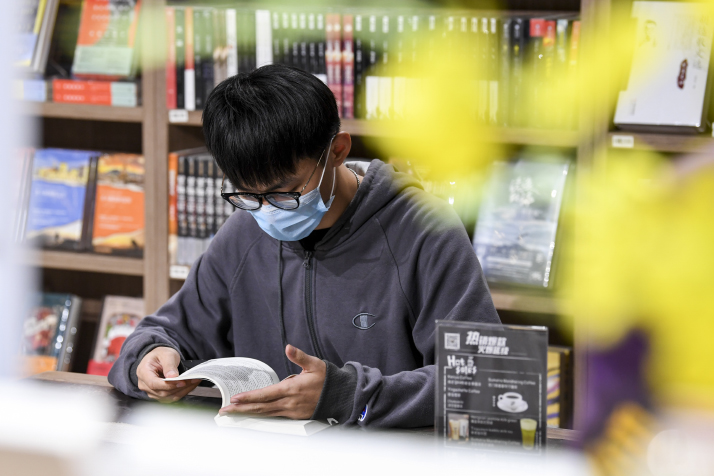| China |
| Bookstores turn the page online to survive | |
|
|
 An employee of the Zhongshuge Bookstore in Beijing recommends a book through live-streaming on March 18 (XINHUA)
Previously known as One-Way Street, OWSpace is a bookstore chain whose sprawling stores in Beijing are among the city's cultural hubs. To celebrate World Book Day, April 23, it started a novel 360-hour live-streaming program on April 14 on four platforms, including Douyin, the popular video-sharing app known as TikTok overseas. Through the program, viewers can learn about the bookstores, their products and activities on offer while writers can introduce their new books and tell their personal stories.
This is not the first time that OWSpace has resorted to the online technology to appeal to readers. On March 9, Xu Zhiyuan, a cofounder of the bookstore and a celebrity author, had an online surprise for book lovers. With the founders of five other bookstores and Weiya, a popular live-streaming star whose magic patter has sold things as complex as rocket launching services online, Xu organized a kind of lucky dip on e-commerce platform Taobao. Each bookstore prepared packages priced at 99 yuan ($14). Inside, there were books and creative cultural products such as notebooks but the book titles were not disclosed to viewers. The 95-minute live-stream sale attracted 140,000 viewers and sold 7,000 packages. Hit hard by the novel coronavirus outbreak, many brick-and-mortar bookstores are trying to expand their sales channels to stay afloat. According to Centrin Ecloud, a big data platform for China's publishing industry, in the first quarter of the year, the book market saw sales down 29.16 percent year on year to 3.65 billion yuan ($516 million). While online book sales earned 2.45 billion yuan ($346 million), down 19.53 percent year on year, offline stores suffered more, amassing only 510 million yuan ($72 million), down 53.71 percent. Chinese brick-and-mortar bookstore alliance Shumeng conducted a survey among bookstores earlier this year. It found about 90 percent of its 1,021 respondents nationwide had remained closed as of February 5, and 79 percent said their current funds could support operations for only three months more.  Buyers select books at the Zhongshuge Bookstore in Beijing on March 18 (XINHUA)
Finding a way out
In Chongqing in the southwest, He Sijia was tapping the app of food delivery platform Meituan Waimai to buy something. However, what she was looking for was food not for the stomach but for the mind. She placed an order for Japanese business strategy guide Yuji Akaba's Zero Second Thinking and in 40 minutes, the book was on her doorstep. Since February 12, Meituan Waimai is collaborating with the local branch of Popular Bookmall, a Singapore-based bookstore chain, to provide book delivery service. "We wanted to launch book delivery service a year ago. The epidemic accelerated the process," a manager of the local branch told Chongqing Daily. With food delivery platforms too looking to extend their services, they are ready to use their logistics system to deliver other things as well. In Beijing 72 bookstores have launched book delivery services through Meituan Waimai. A white collar worker in Beijing identifying herself only by her surname Huang said while buying lunch online one day she noticed a promotion for American author Tara Westover's memoir Educated and ordered it. To her surprise, the book came in 30 minutes, faster than her lunch. Huang told China Youth Daily she used to visit bookstores regularly and now the delivery platform has given her opportunities to continue reading despite the epidemic. Although the delivered books cost more than those sold in stores, since the original price is not expensive they still remain affordable. On March 20, three of Chinese conglomerate CITIC Group's book chain stores also launched online delivery services. Liu Min, Deputy General Manager of CITIC Bookstore, told China Youth Daily that literature and children's books were selling the best, followed by dictionaries and books to learn English. Page One, Singaporean entrepreneur Mark Tan's bookstore chain, has three branches in Beijing offering delivery services on an app. Chen Peng, General Manager of Page One, said the store's foreign books, priced similar to those available on e-commerce platforms or even cheaper, can be delivered faster than the latter. But though embraced by many brick-and-mortar stores, delivery service is not a complete cure. "The effect of book delivery service has not been as good as we imagined. Many customers don't know about it until they come to our outlets," Chen confessed. Then there are other challenges. Fu Shuai, General Manager of Waiyan Bookstore affiliated with the Foreign Language Teaching and Research Press, told China Youth Daily their books were selling well on Meituan Waimai because of discounts. "Once the discounts end, bookstores cannot sustain sales in the long term," he said. Also, the delivery service usually covers only customers within a radius of 3-5 km from the bookstore, so many people cannot access the service. Stores need to find more viable ways to sell their books online. Ren Jing, Curator of Chongqing Library, told Chongqing Daily that bookstores should transform from being simply a platform for selling books to a cultural communication platform. Such communication can be organized both online and offline and once the mode is established, bookstores can find a new way of survival. Sun Qian, founder of Shumeng, told media that going online would also enable bookstores to spread culture more widely and gain more opportunities to interact with readers. Luo Dongqi, Dean of the School of Business Planning of Chongqing Technology and Business University, said that with people today savoring consumption experiences online, bookstores should also go online to provide readers better services. In Qingdao, a coastal city in Shandong Province in east China, many bookstores reopened in March after the epidemic was brought under control. The Fangsuo Bookstore was back in business on March 1 with epidemic control measures such as taking customers' temperature at the entrance, taking their contact details and asking them to wear gloves when going through books. The bookstore is now organizing online writers' salons as well.  A visitor reads at a bookstore in Nanning, Guangxi Zhuang Autonomous Region, on March 15 (XINHUA)
Government support To help bookstores tide over the difficult period, the government has stepped in with subsidies. The Peking University Bookstore, for example, received 300,000 yuan ($42,426) as rent subsidy in late March. The bookstore, which opened in 2018, sells primarily textbooks. At the beginning of semesters, it is usually packed with students. However as the university's spring semester hasn't started yet this year and students haven't returned to school, it is selling books just online. "Our biggest difficulty was rent. The rent for our 1,000-square-meter bookstore is over 600,000 yuan ($84,852) a year. But the subsidy has solved our problem," Xu Jun, a manager of the bookstore, told Beijing Youth Daily. (Original Title: A New Chapter) Copyedited by Sudeshna Sarkar Comments to jijing@bjreview.com |
|
||||||||||||||||||||||||||||
|